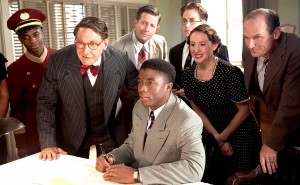
“42” tells the story of Jackie Robinson, the first African-American Major League baseball player, delving into the world of 1947, a time rank with racism and hate. Though the movie does not make any major cinematic impressions, it respectfully tells the story of the man who changed the face of baseball forever.
The film begins with reporter Wendell Smith (Andre Holland, “Miracle at St. Anna”) voicing over poignant images which depict the political climate of the time. The year 1947 proves to be the first wherein an African-American plays Major League Baseball – yet the transition is not without its challenges. As demonstrated within the film, Jackie Robinson (Chadwick Boseman, “The Kill Hole”) faced death threats from both inside and outside the stadium, in addition to dealing with segregation and the constant insults thrown in his face.
Both widely known and up and coming actors are equally represented in the film. Branch Rickey (Harrison Ford, “Indiana Jones”) and Leo Durocher (Christopher Meloni, “Law and Order SVU”) are two of the few characters who support Robinson from the first moment he steps on the field, though both for reasons that are not political. Ford’s character is likeable and funny, providing simple one-liners that give the film the levity it needs when presenting such a difficult period in history.
Boseman’s representation of Robinson is stunning, especially considering the fact that he has not yet been in any other acclaimed movies. He accurately demonstrates the struggles he faces, as well as dealing with a wife and child at home whose safety he is forced to worry about in addition to his own.
One particular scene stands out in its amazing depiction of the turbulence of emotions surrounding this story. After Robinson has spent two at bats being excessively yelled and catcalled at by the Phillies manager (Alan Tudyk, “Firefly”), he breaks down in the tunnel next to the dugout, slamming his bat against the wall before collapsing in tears. Rickey comes upon him in these moments, pulling Robinson to his feet and reminding him that those who don’t believe in Robinson can only be defeated through baseball and baseball alone.
Excellent cinematography is one of the defining features of this film, with its crystalline quality and sharp colors. The positioning of the actors is often incredibly powerful, especially during a scene in which Robinson is encouraged by his teammate, Pee Wee (Lucas Black, “Fast and the Furious: Tokyo Drift”), and the players are depicted side by side, arms around each other with the screaming crowd in the background. Images such as this one add intensity and emotion to the film, visually representing the struggles and triumphs that the characters within it experience.
Though the movie presented a tumultuous point in the past with accuracy, the directors and screenwriter played it safe. Sports movies that deal with internal and external difficulties have long been enjoyed by the public, but after viewers have seen so many, it becomes a struggle to be truly affected by such an emotional and passionate story. ‘42’ easily could have been one of the most defining movies of 2013, but it fell short of expectations after so many other innovative films this year. The only question that remains is why did it take so long to make a movie on such an important historical figure? Perhaps if it had been created earlier, the story could have been enjoyed to its fullest extent.











